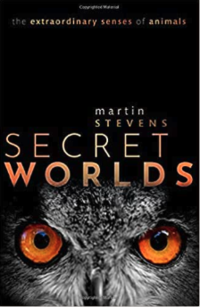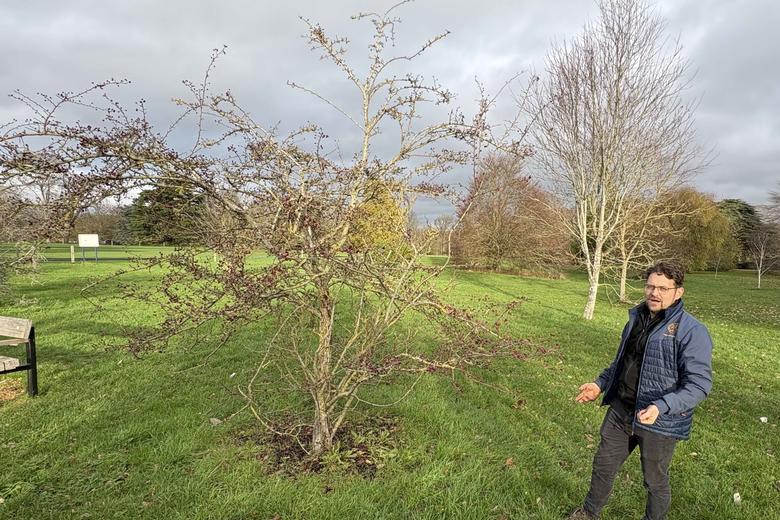OFF THE SHELF: JUNE 2023

OFF THE SHELF: JUNE 2023
This month, animal senses, the invasion of Ukraine, the symmetry of all things, how to edit your life and literary poisonings
Published: 1 June 2023
Author: Richard Lofthouse
Share this article

Secret Worlds: The Extraordinary Senses of Animals by Martin Stevens (Oxford University Press, 2023)(PB)
Always a proof of pudding when an academic book goes to a paperback edition. Just out, this delightful volume by a professor of evolutionary Ecology at Exeter University shows us intricacy after intricacy of animal, insect and marine invertebrate adaptation to succeed in otherwise impossible habitats. To cite just one example: there is a cave dwelling fish called the Mexican tetra. Its surface-dwelling cousins have eyesight, but permanently in the dark it has shed its eyesight and gets by just fine in a state of total blindness. The eyesight function consumes up to 15% of the fish’s energy. By removing an unneeded faculty the cave-dwelling tetra becomes more efficient, reducing its need to feed. From barn owls to blowflies there is a great fascination here.

Invasion: Russia’s Bloody War and Ukraine’s Fight for Survival by Luke Harding (Guardian Faber, 2022, PB 2nd Edition June 15, 2023)
Updated this month in paperback form with new material, Luke’s (Univ, 1987) remarkable account of Russia’s invasion of Ukraine has also been shortlisted for the Orwell Foundation’s 2023 Political Writing Book prize. The other contenders are all compelling in their own way but Luke’s contribution is very fine and surely stands a chance for the prize.
Centrally, he did the seemingly impossible, generating a profound commentary on the invasion that drew on years of experience as Guardian Moscow correspondent, while at the same reporting on the ground, often at great risk to his own safety. It starts on February 24, 2022, the fateful day when Russia hugely widened the scope of a pre-existing war with Ukraine and began a full scale invasion, and then moves around and forwards to 2023 but within chapters that have a broader thematic purpose. For instance there is a chapter that considers whether Ukraine is ‘horizontal’ whereas Russia is ‘vertical’, an attempt to characterise some of the profounder cultural differences that many of us are only beginning to learn about from a position of relative ignorance. Almost miraculously, the book fizzes when no one would expect a book at all. How did he do it? We were able to place the question and he said that he was granted time off after harrowing stints near the frontline, but instead of relax he found a sort of solace in writing furiously day after day until the book was done. The original hardback came out last November, but make sure you get the 2023 paperback, out from June 15, because Luke has added an important additional chapter.

The Language of Symmetry by Benedict Rattigan and Denis Noble (Routledge/Chapman & Hall, May 2023)
Denis Noble held the Burdon Sanderson Chair of Cardiovascular Physiology at the University of Oxford from 1984 to 2004 and was appointed Professor Emeritus and co-Director of Computational Physiology. His co-conspirator and the main lead on the project is Benedict Rattigan (Harris Manchester, 1992) who would apparently be credited with the main insight that was fleshed out an a very unusual conference drawing together completely disparate subject experts; and Afiq Hatta, formerly Trinity Cambridge and owner of an ultra-clever theoretical physics blog simple- salad.ghost.ioi.
The core idea can be likened to the hourglass, invoked early on by Professor Noble:
'Imagine an Hourglass. Grain after grain, sand falls from the top of the hourglass to the bottom. The pile of sand at the bottom of the hourglass becomes increasingly unstable, and at any moment a single grain of sand might cause a small avalanche. When this happens, the base of the sand-pile widens, which increases its over- all stability, after which the process repeats itself.'
Traditionally the universe has been viewed as orderly or disorderly. It’s no particular insight to start knitting them together as having a disposition to each other. No: but the insight here is to interrogate the insight across theoretical physics, planetary systems, music, literature, self and philosophy, remembering that all those fields of inquiry have evolved rapidly since we were all students once.
Symmetry evolves during the book as its own universal property. There is, say the authors, ‘a symmetry between order and disorder.’ There is an almost comic degree to which a tiny book review can’t convey what has been achieved here and the language quickly runs away with the time-starved, social media generation. Yet the following words are very significant and it would be worth your time to obtain the book and spend a bit of time on it:
‘…each form of the language of symmetry revealed a new aspect of the order-disorder principle.’
Benedict offers the following link as a means to grapple one level further.

Edit Your Life: A Handbook for Living with Intention in a Messy World by Elisabeth McKetta (Penguin Random House, 2023)
Elisabeth (Visiting student, New College, 2000) teaches writing for a living at both Harvard and Oxford, so no surprises to find ourselves in the hands of a pro here. Elisabeth lived for three years in a tiny house with her family, an adventure she discusses in her TEDx talk, 'Edit your life like a poem.' In the book she offers eight chapters of editing techniques that can be applied to real life. The first three are ‘asks’; the second three are ‘edits’ and the last two are ‘enjoy’ and ‘accept’. The spring board for much of the insight was an almost intolerable living situation where Elisabeth says she was sunken with distraction and household management. In this broadest sense the good old red pen is the friend of every editor: delete the extraneous, chop the word count, force clarity and intention. And she does. With warmth and humour.

Poisonous Tales: A Forensic Examination of Poisons in Fiction by Hilary Hamnett (Royal Society of Chemistry, 2023)
Poisons and poisonings have been a common character in literature from ancient times to the modern day. Who didn’t grow up reading with a sort of childish absorption the tale of Snow White? From Shakespeare and Dickens to Hugo and Poe, the macabre world of literary poisonings is as large as it is fascinating. Poison allows dramatic tension because it touches on real life fear while remaining clandestine, as any good Russian agent knows too well. But what is fact and what is pure fiction asks Hilary Hamnett (St Catz, 1999)?
Utilising real forensic science Poisonous Tales explores the real science inspiring the toxins and tinctures in our favourite works. Could a poison really mimic death in Romeo and Juliet? What is the cause of the mad Hatter’s malady in Alice in Wonderland? And could a stone from the stomach of a goat really have been used as an antidote in Harry Potter and the Half-Blood Prince? Through these and many more ‘cases’ we discover the captivating truth in the texts and how real-life tragedies can replicate themselves in fiction.
Off the Shelf typically concerns books where there is an Oxford connection, whether the place, the University or of course the author.
Alumni can claim 15% discount in any Blackwell's store with a My Oxford Card.
Alumni can claim 20% discount at Oxford University Press.
Join the Oxford Alumni Book Club at: www.alumni.ox.ac.uk/book-club
Lead image: Shutterstock















